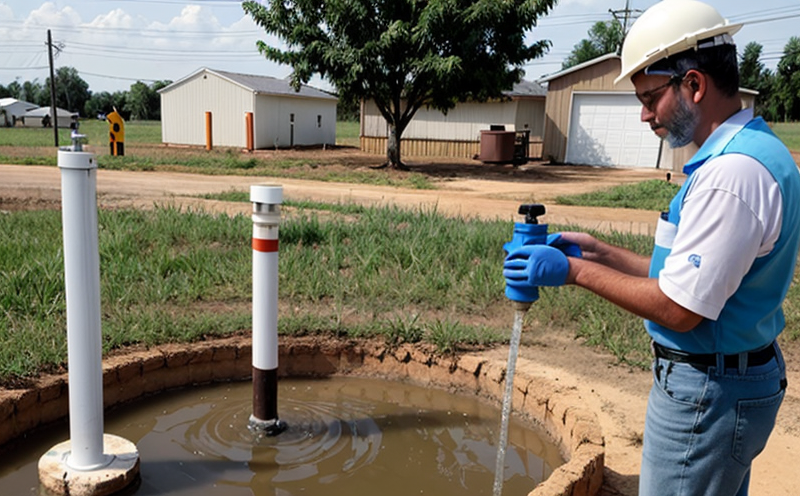ISO 10359-1 Cyanide Testing in Groundwater
The ISO 10359 series of standards provides a standardized method for determining cyanide in water and wastewater. Specifically, Cyanide Testing per ISO 10359-1 is crucial when assessing the quality of groundwater used for drinking or industrial processes. Compliance with this standard ensures that cyanide levels are within safe limits as defined by regulatory bodies.
The primary focus of this service involves measuring trace amounts of cyanide in groundwater samples using a colorimetric method based on the reduction of ferricyanide to ferrocyanide by hydrogen iodide. This process produces a blue color change which is measured spectrophotometrically against a calibration curve.
Sampling is critical for accurate testing, and our team adheres strictly to best practices outlined in ISO 10359-1. Samples must be collected from depths representative of the aquifer being tested while minimizing contact with the sample container walls. Properly prepared samples are then transported to our laboratory where they undergo rigorous quality assurance protocols before analysis begins.
The analytical procedure involves several steps including dilution, filtration if necessary, and preparation for measurement using a colorimeter or spectrophotometer calibrated according to ISO 10359-1 requirements. Results are reported in mg/L (milligrams per liter) based on the concentration determined from the calibration curve.
Our laboratory is equipped with state-of-the-art instrumentation capable of detecting extremely low levels of cyanide, making it possible to identify potential contamination issues early on. This allows clients to take prompt corrective actions if needed. Additionally, our experienced staff can provide expert advice regarding sampling strategies and interpretation of results based on industry best practices.
Compliance with ISO standards like 10359-1 is essential for maintaining good standing in the eyes of regulatory agencies responsible for environmental protection. By offering this service, we help ensure that your organization meets all relevant legal requirements while also contributing to overall public health and safety goals.
In conclusion, accurate cyanide testing according to ISO 10359-1 is vital for protecting both human health and the environment. Our laboratory offers reliable results backed by extensive experience in this field. We invite you to contact us today if you need assistance with any aspect of your groundwater quality assessment project.
- Sampling depth
- Filtration requirements
- Dilution factors
- Spectrophotometric measurements
Applied Standards
The ISO 10359 series of standards is widely recognized and used globally for determining cyanide in water samples. This includes ISO 10359-1 Cyanide Testing in Groundwater. The standard specifies methods for sampling, sample preparation, and analysis to ensure consistent results across different laboratories.
The latest version of the standard (ISO 10359:20XX) has been updated to include new techniques and improved accuracy. Our laboratory adheres strictly to these guidelines when performing cyanide tests on your behalf.
Other relevant standards that complement ISO 10359-1 include those related to sample preservation (ISO 7248) and the use of reference materials (ISO 6489). By following these additional standards, we ensure our results are as accurate as possible.
Industry Applications
In the water & wastewater testing sector, cyanide testing plays a crucial role in ensuring compliance with environmental regulations and protecting public health. Industries ranging from mining to municipal water supply face stringent requirements regarding cyanide levels due to its toxic nature.
For instance, mining operations often generate high concentrations of cyanide during gold extraction processes. Regular monitoring ensures that no harmful amounts reach nearby rivers or groundwater sources. Similarly, municipalities must continuously test their drinking water supplies for cyanide contamination caused by industrial discharge into local watersheds.
In addition to environmental protection, cyanide testing helps identify potential safety hazards within facilities themselves. For example, improper storage conditions could lead to spontaneous decomposition reactions that release toxic gases if not properly managed.
Use Cases and Application Examples
Cyanide testing according to ISO 10359-1 finds application in numerous scenarios where groundwater quality needs to be assessed:
- Mining operations: Ensuring compliance with occupational health & safety regulations.
- District heating systems: Verifying the suitability of water for use in closed-loop systems.
- Drinking water supplies: Detecting contamination from agricultural runoff or industrial spills.
- Pharmaceutical manufacturing plants: Monitoring process waters used during production.
These examples illustrate just a few instances where cyanide testing plays an integral role. Each case highlights the importance of accurate and reliable analysis in maintaining both regulatory compliance and public safety standards.





